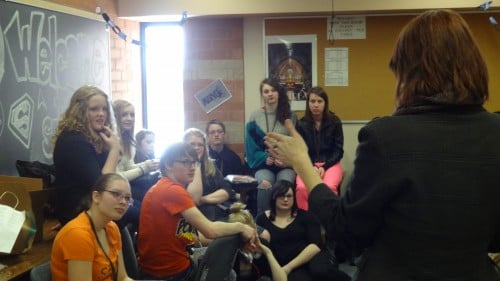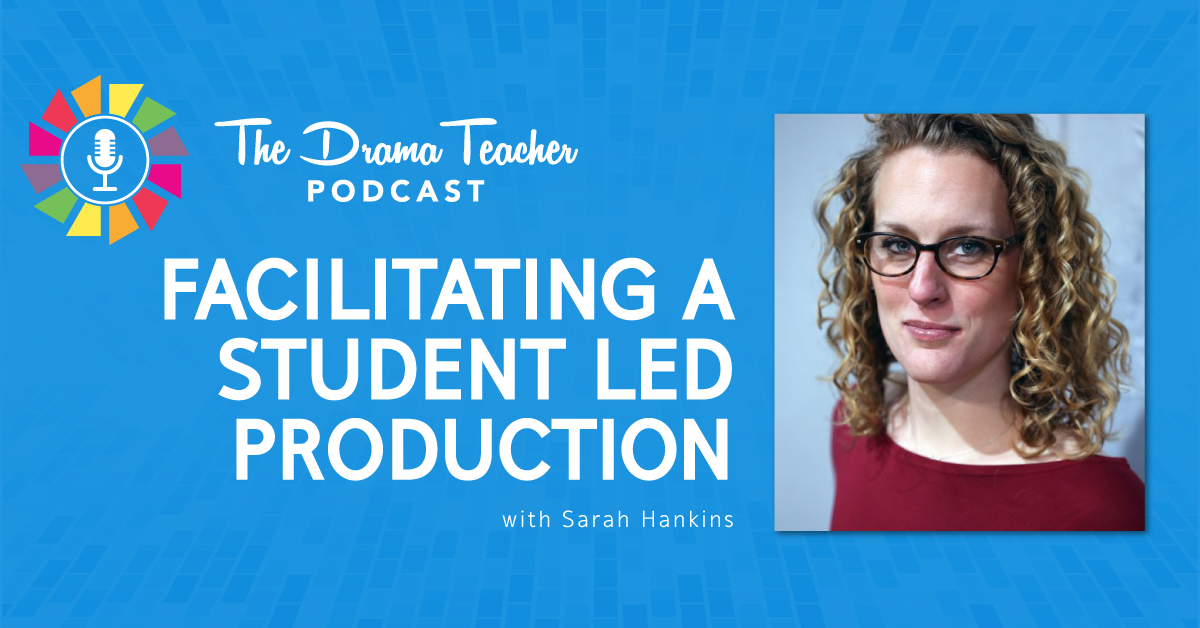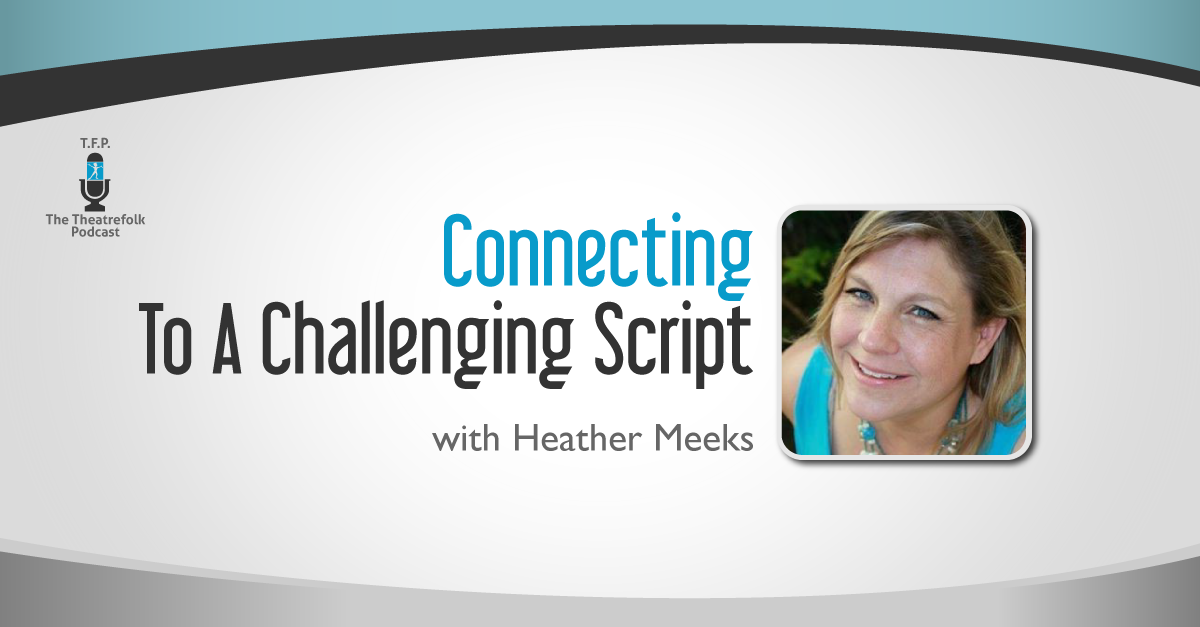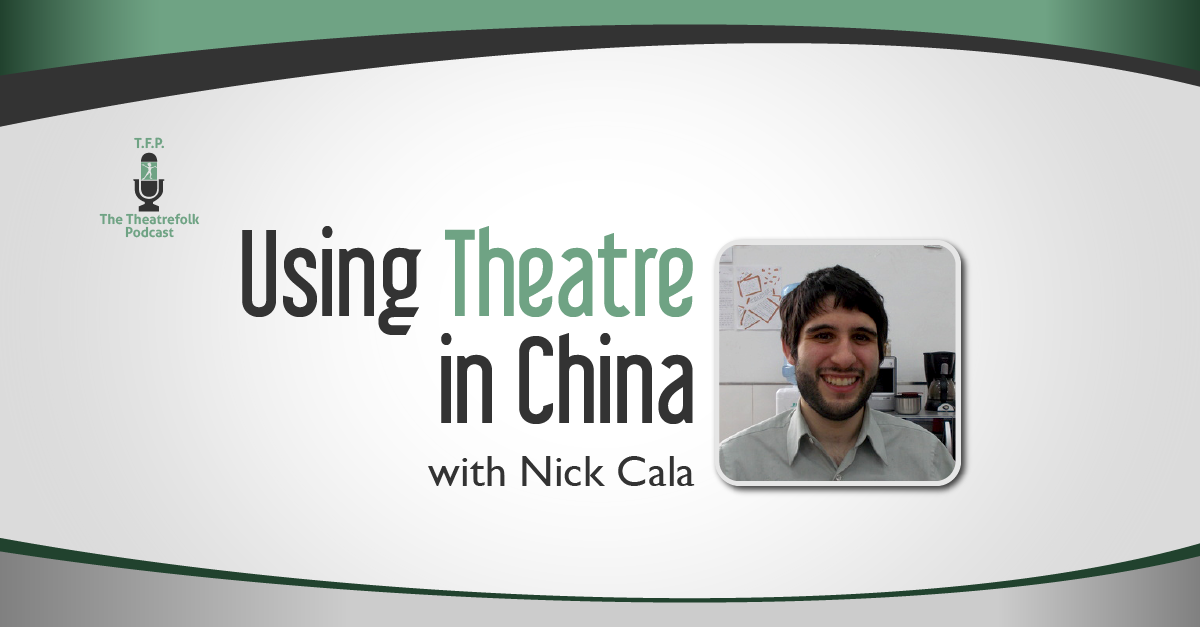Once Upon a Midnight Dreary
Episode 34: Once Upon a Midnight Dreary
In this episode Lindsay talks with high school actors as they prepare to present her adaptation of Poe stories and poems. Based on this production, Lindsay is changing the title of the play and removing a character. And yes, those are good things.
Show Notes
Subscribe to The Theatrefolk Podcast
Episode Transcript
Welcome to TFP, The Theatrefolk Podcast. I am Lindsay Price, resident playwright for Theatrefolk. Hello! I hope you’re well. Thanks for listening.
Today, we’re going to hear a cast talk about their rehearsal journey and how their work that they did had a direct influence on mine. But first, let’s do some THEATREFOLK News.
Okay. So, since we’re going to be talking about Poe and my adaptation of Poe which is now called Shuddersome: Tales of Poe, which I feel like I’ve been talking about on and off for, oh, two years now, but now, now, finally! It! Is! Time! My adaptation of a selection of Edgar Allen Poe’s stories and poems, Shuddersome: Tales of Poe, is going to be published! It’s going in the catalogue! The publishing proof is being worked on as I speak. Hooray! Finally! Hooray!
After multiple, multiple, multiple workshops, two productions and the killing of many, many trees, we’re ready to go. And, frankly, though I sometimes felt like chucking the whole thing off the tallest building after another teacher stopped talking to me about the play, you know what? I think it really did need this time.
Taking a piece of literature from one medium and transforming it into another is not easy. I think, if you’re doing it right, it shouldn’t be easy because, at the heart of it, the key word is transform. You can’t just take a story and dump it into a play format. Well, you can, and I have seen it done. I’ve seen it done a couple of times with Poe and it just doesn’t work fully. A full transformation into a play – a piece of theatre, that’s key, too, right? So, I’m so thankful for St. Roch for tackling this piece in the fall which really gave me the confidence I needed to say, “Yes! This is a play!” And then, I’m so thankful for Listowel Secondary who had to face a lot of adversity getting their production on its feet and they gave me the confidence with their performance to say, “Yes, this is a good play. This is a piece of theatre.” Okay, I’m going to go on but let’s get the rest of this intro out of the way so I can continue to babble.
All right. So, lastly, where, oh, where can you find this podcast? We post new episodes every Wednesday at theatrefolk.com and on our Facebook page and Twitter. You can find us on the Stitcher app, AND you can subscribe to TFP on iTunes. All you have to do is search on the word “Theatrefolk.”
Episode Thirty-Four: Once Upon a Midnight Dreary….
….as I pondered weak and weary. So, the bulk of this podcast is going to be a talk that I had with Listowel Secondary School students last week. They were performing my Poe play, Shuddersome: Tales of Poe, as part of the Sears Drama Festival and I caught them after their tech and before their performance.
What really, really stuck me about this cast is how calm they seemed and how much of a community they seemed. They knew they had worked hard together. Due to some issues, the cast worked mostly with a student director for their rehearsal period and they just really gave the impression that they were ready to go, they were ready to perform. It was a very difficult piece but they had put in the time and they were confident in a positive way. And, to me, that is the embodiment of ensemble. You work together and reach a final goal. You work hard on it even if you are totally unsure of what you’re working on and, as you’ll hear, there were times when they did not know if what they were doing was going to work and yet they kept at it. I love that.
So, let’s get to it.
Lindsay: So, what I really wanted to do was I just wanted to talk to you and hear about your experience working on Poe because, one, it’s not a normal kitchen-sink kind of piece which I love. I loved working on it, I loved that you tackled it, and also, it hasn’t been a traditional kind of type rehearsal. You guys sort of had to come together and work on it yourselves, and keep working on it, and I think that’s fantastic. I’m so happy that this is happening, you know?
So, the first thing I want to know is, when you first got the script, what were some of the first impressions? What were your first impressions of working on Poe? Yes.
Respondent: I honestly didn’t know what to say. I was kind of, like, “I don’t know what we’re going to do with this.”
Lindsay: Right.
Respondent: Like, I’m not surprised that it’s gotten where it is now. But I was just… I couldn’t believe that actually…
Lindsay: Let me tell you, when I started working on it, I was like, because some of the stories are just – and I had to cut, The Pit and The Pendulum used to be in it and there was a production in the fall and I just looked at it and went, “Out.” And just because some of the stories are so much in the head, right? Because they’re stories – they’re on the page and they interact with the page – so the whole notion of bringing them to life is a little bit daunting.
So, was that kind of what some of you were feeling? I see lots of nodding of heads. Yes, yes, what else? Yes, tell me.
Respondent: Here comes another ensemble piece.
Lindsay: Is that good or is that bad?
Respondent: Oh, it’s a great thing!
Respondent: Yes, yes!
Respondent: Those of us who were here last night, the adjudicator said, “I love ensemble pieces.”
Lindsay: You know why? Because, well then, you get stuff to do, there’s stuff to do. And I know some of that stuff is arms up, arms down. But for me, the audience, I loved that. I love seeing… See, I am an ensemble freak. I love… I sit in the audience and I watch the guy at the back who’s, like, doing his thing. I watched you in the mask of red death with your little piece of food. You know? I watch ensembles so that is my… I love it and I love it when, with what a lot of what your work was doing was ensembles are working together for the good of the piece because that exactly is kind of what theatre is. The community of it instead of one guy standing up front with 40,000 lines and someone at the back with ten, and everybody counting, you know?
What else? Yes.
Respondent: Like, most of us had no clue what we were reading. We kind of had to go through and, like, translate it to, like, English.
Respondent: Yeah.
Respondent: We had to go through it and explain, like, what was going on.
Lindsay: I so wanted to take out that last line, “The red death is in the…” I can’t even say the word.
Respondent: And then in the [gibberish].
Lindsay: Right? But I’m like, “No! I’m not changing Poe. I am theatricalizing Poe,” right? That’s a whole different, that’s a different thing so it means I have to I have to stay. Sorry, yes?
Respondent: It’s all really dark.
Lindsay: Yes? Actually, you know, actually, you know what’s really funny? It’s not because, the script, there’s Lionizing – that short story Lionizing which is all about a nose. He actually wrote really, really funny. He just was really good at both. He knew what sold. He knew that… Poe knew that The Raven would be a really good seller and it was.
So, is that a half-yes?
Respondent: Yeah.
Lindsay: Yeah!
Respondent: I think it’s that I know Poe really well and I thought it was really true to it…
Lindsay: Thank you!
Respondent: …and how he wrote and, like, the style of it, so…
Lindsay: That was my intention. My intention always… Another thing I really love, I love doing adaptations. I love taking something from one form and putting it into another. And that’s sort of my goal. My goal is not to change but to interpret and to make sure that whatever is at the core of it or at the heart of it is still there – which is sometimes harder to do than others. But some of it’s very theatrical. I think The Tell-Tale Heart is very theatrical. I think The Bells is very theatrical if you sort of, you have to dissect it a little bit, but I thought you guys did really well.
So, what was it like rehearsing? What was it like, Matt, as the student director? What was it like sort of bringing this to life? And you’re of the key, right? In terms of, like, making a movement out of all this.
Matt: Incredibly stressful at times.
Lindsay: Oh!
Respondent: It’s hard.
Matt: From the start, I knew these guys could do it and, like, I had faith in what they could do.
Lindsay: Well, that’s half your battle there.
Matt: Sometimes, I know I wanted to run up and smack all of them but I can’t do that.
Respondent: Well, we felt the same way, don’t worry.
Respondent: Yeah!
Matt: But I think it came together and I’m happy that I have the cast that I have and yeah, they’re going to do good.
Lindsay: It’s going to be a fantabulous show tonight, isn’t it?
Matt: Of course, it is!
Lindsay: Absolutely. So, I hear that some of you, first of all, I was really, really impressed with how alive the poetry… That is hard to do. It’s hard to get out of, “I’m going to speak in poetry voice,” and I understand that you guys, like, watched documentaries, you, like, did a lot of… What kind of stuff did you do to really get the poetry into you?
Respondent: We really felt the poem.
Respondent: We kind of had to figure out, like, where his darkness exploded from, like, the way he was adopted and, like, just his background to figure out what, like, got him to be able to write the way he did, sort of. Like, what gave him the emotion he clearly had and stuff like that.
Lindsay: Yeah, what else?
Respondent: I personally went and, like, went through the works that you did it off of and I, like, okay, this is what it’s like and the whole, “How are we going to push it forward?” That was just kind of what I did when we got the script.
Respondent: And what Krissy said, we had to go back through and figure out what it actually means and that probably helped a little.
Lindsay: It helps, doesn’t it? Well, it helps when you know what you’re talking about and where it’s coming from.
Respondent: I guess that our own strengths was a big part. I mean, some of us are a little lighter than others, like, in The Bells, like, three younger ones… Like, the Silver Bells were very light-hearted. And then, like, the Iron Bells, they were able to go to, like, a dark place and not maybe emotionally but just in the way their voice…
Lindsay: I thought you were pretty dark in The Oval Portrait. There was lots of…
Respondent: Yeah, we had to get her there though.
Respondent: It took a long time.
Respondent: It took some time.
Lindsay: Well, that’s good though. That’s good.
Respondent: I think that with, for example, The Bells, there is not really much of a storyline. It’s more of just telling stuff. And I feel like we kind of brought a storyline to something that’s, I don’t know, I like how we dealt with that because it helped it bring it to life. And, as you said, it’s poetry and now we’re bringing so much to it that it helped us bring it to life.
Lindsay: It’s all about taking something in one medium and making theatre, right? So, it has to come alive. It has to. You can’t just stand. So, that was a lot of my job when I’m just sort of just trying to put it on the page, I’m like, “Okay.” So, if we’re looking at The Bells, here are the images that I’m, you know, suggesting. And, sometimes, there’s going to be productions where they’re going to go, “Okay, I’m just going to use these images,” and sometimes, they’re going to be like, you guys were like, “This is what I see!” and that’s the cool thing for me. I love, I love when you can take something off the page and just sort of run in a direction with it.
Did you ever think that what you were doing was not going to work? Was kind of crazy?
Respondent: Oh YES!
Respondent: But the nice thing about YouTube is that, when we started it, a lot of Poe you have to hear so we found a version of The Raven, a version of The Bells being read, and then visual versions of The Red Death, and The Oval… Well, all the stories and we had the one Facebook, we had started a little Facebook page that the cast was watching and that’s where the documentary for Poe went. So, it was nice to be able to find that and actually hear the words being spoken.
Lindsay: Right. And speaking of which, because there was one, The Oval Portrait, has no words at all. What was that like for you working on?
Respondent: It was fun.
Respondent: Yeah.
Respondent: It was a fun thing to put together.
Lindsay: Yeah, go ahead.
Respondent: I personally love doing those kinds of things where you’re not speaking. You’re just moving and…
Lindsay: Trying to tell a story with just you, right?
Respondent: With facial expressions.
Lindsay: And your facial expressions.
Respondent: Yeah, mostly.
Lindsay: Whose decision was it to use a drum?
Respondent: It wasn’t even actually… He, one night…
Respondent: It was a joke at first.
Lindsay: Yeah, so what was your…?
Respondent: To bring, like, since there’s no words, to bring music to it.
Respondent: We needed a beat.
Respondent: He was like, “I’ll just sit here and drum.”
Lindsay: It’s very interesting. It makes it very ominous, I think. And yet, there’s another interesting one because, in the production in the fall, The Oval Portrait had narration to it and it was another one of those things where it’s like, because I had it with just the action and then, we went, “Ah, no, maybe I need some more, maybe words?” and I’m like, “No, I should’ve stepped with my instinct,” and that’s why I put it back. I quite like it. I like how the whole… Again, it’s about what is, in terms of theatricality, it’s different forms, right? So, if we have the poetry and we have, you know, something like The Tell-Tale Heart and The Mask of Red Death which are, you know, character-driven, we need to see what it looks like with something else, and it works really well. I like the trying to find a way to say what’s happening to the young woman, you know, without the description of, well, her life’s soul is being taken away. Great! Awesome. How do I… I am the soul, I have a little sign that says “soul” and I am taking it away. But, you know…
Okay, so, what’s your favourite story?
Respondent: The Oval Portrait.
Respondent: I’d say The Bells for me. I was thinking of that today and, like, I know it’s more of a cheerful one. It’s like multiple, like, different kind of feels to it, I guess, because it goes from, like, really happy to getting, like, dark kind of. So, I don’t know, I like the feel of it.
Lindsay: Happy to death. Yes.
Respondent: Personally, I actually do like The Mask of Red Death…
Respondent: Yeah.
Respondent: …because it’s showing how ignorance can be deadly.
Lindsay: Ah! Love that. Yes, yes?
Respondent: I like The Raven the most. Like, I’ve heard The Raven many times before but I never really understood it until we rehearsed it over and over again. And like, I mean, I understood it at, like, surface. But, to get really into it, it was nice to rehearse it and I feel like our job is to kind of make the audience understand it the way we’ve understood it.
Lindsay: Absolutely, absolutely. I think you guys did a wonderful job with it.
Respondent: I personally liked The Oval Portrait, mostly because it was one of our first pieces that we’ve done with no speaking. Like, it was all… Like, a simple way they use step – that could mean something so much bigger than an arm movement so it was every movement you made made that, like, what it was. So, it was hard, especially because we ended up having to switch characters in it.
Respondent: Yeah.
Respondent: So… But it worked out.
Respondent: It was fun to do though. Like, that one was fun to put together.
Respondent: You have a feel into it because, like, you have no choice but to really, like…
Respondent: Watch.
Lindsay: That’s right. You have nothing to fall back on so you have to put it out there, otherwise, you know, the audience is going to be like, “What is she doing? She’s sort of flailing her hands?”
Respondent: Yeah, because I remember the first time we did it, someone was mentioning how, like, they didn’t really understand how, like, everything was going together and that one, like, they didn’t know what was going on. So then, when we rehearsed it again, like, we made sure there was bigger arm movements, more like…
Lindsay: Well, it’s amazing. It really is amazing what, how this means nothing but this means something and that’s just all it is. That’s acting, right? You know, where it’s communication, right? That’s all it really is. How you communicate. Are you communicating to the audience?
I have to say, I used to be, well, Lionizing, the one that’s – just because it’s so funny but it’s not here. Actually, another one that I really wanted was called Berenice where a guy gets so obsessed with a woman’s teeth that, as per Poe, a young woman dies but she’s not really dead and she gets put in a grave and he goes to her grave and then pulls out all her teeth. But she’s not dead! It’s just like, no! But I have to say, your rendition of The Bells just made me go…
Respondent: That one took us, like, the longest time.
Lindsay: The Mask of the Red Death used to be my favourite but now I think The Bells is my favourite.
Respondent: Yeah
Respondent: Well, The Bells took us forever to figure out.
Respondent: Yes.
Respondent: Like, we changed it so many times as to, like, what we were going to do.
Respondent: Because, I think, at first, we didn’t actually know what it was about.
Respondent: Yeah.
Respondent: Until we actually went through and figured out and then said, “This is what we need to do.”
Respondent: We wanted to make into, like, a story.
Lindsay: Yeah, and that’s your job. You did it well. Awesome!
So, absolutely, I think that you guys are going to be fantastic and what you’re going to do is put on a theatrical… This piece is a theatrical journey and I think, really, as a playwright, that’s all I can ask – that you take what I’ve, you know, sort of cobbled together and to take it on a theatrical journey so I’m really, really thankful for that.
I’m so thankful this is going on and that it happened and that Sears lives and it’s all good.
Respondent: Go Sears!
Lindsay: Yes! YES! Go Sears!
So, not only did these guys go on to nail their performance – it was indeed a theatrical experience! – but they were also selected to move on. They were one of three Outstanding Performances and so they’re going on to the regional level and I couldn’t be happier.
So, here’s the thing about how seeing work when it’s still in its development stages really influences what I do. So, based on this production, I removed a character, changed the title, and came up with a sort of new thematic introduction, which sort of seems like a lot, but I know it’s not really because it’s still… The core of everything is still in place.
When I saw the place in October, I took out a whole story and I changed one of the stories to take out the narration. This is necessary. This is how I learn as a playwright. You know, for example, the title, Shuddersome is actually the play’s original title, one that I started out with way at the beginning of the process then I sort of doubted myself a little bit. I thought I needed the title of one of the stories in the play’s title and then realized that, if a school was going to produce it and they were looking to make a competition length cut, what if they wanted to cut the story that was in the title? And I came full circle and here we are.
Shuddersome: Tales of Poe. That’s how it works. You sort of have to keep going in circles, keep thinking about what my intention is, what I want, and it’s about a balance, too. It’s about finding the balance between staying true to the work, but also, being open enough to make the work the best it can be. And that’s how the writing process goes. This is why theatre does not live on the page. It lives in the mouth and the actions of actors breathing life into the characters. And sometimes, it takes more than one production of a play to see it come to life, to solidify the text. And you learn something new with every interpretation, with every approach. And sometimes, what you see with a play, it’s like, “Oh…” You know, you have to sort of determine whether it’s the script or whether it’s the interpretation. But that’s part of the job and that’s why there’s no such thing as a perfect first draft. I don’t think so, anyway. And now, I can, literally and metaphorically, close the book on Shuddersome: Tales of Poe and move on to the next piece, the next experience, the next production.
And that’s where we’re going to end. Take care, my friends. Take care.
Music credit: “Ave” by Alex (feat. Morusque) is licensed under a Creative Commons license.



